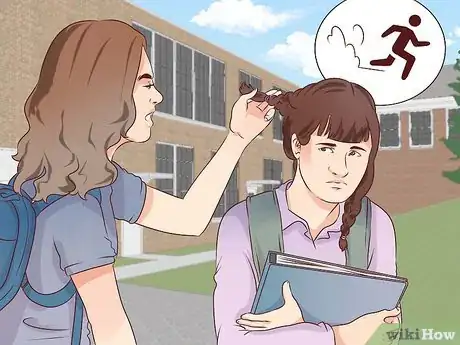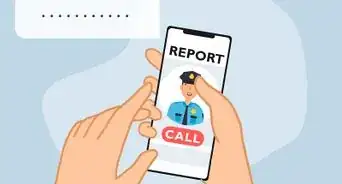This article was co-authored by Nancy Lin, PhD. Dr. Nancy Lin is a Licensed Clinical Psychologist and the Owner of Go to Sleep San Diego, a private practice providing therapy for people suffering from insomnia, trauma, depression, and related problems. She is also trained in issues related to cultural diversity in mental health. Dr. Lin holds a Bachelors degree in Psychology from The University of California, Berkeley and a Masters degree in Medical Anthropology from the University of London, SOAS. She earned her Ph.D. in Clinical Psychology from The University of Massachusetts Boston and completed an APA-accredited internship and postdoctoral training at the VA San Diego Healthcare System (VASDHS).
There are 10 references cited in this article, which can be found at the bottom of the page.
This article has been viewed 104,285 times.
Being bullied is never easy and in severe cases, it can really hurt. Confronting a bully can help build your self confidence and put an end to the bullying. While you should stand up for yourself, you also do not want to start a physical altercation. Fighting will not, ultimately, solve the problem and you or someone else might get hurt.
Steps
Confronting a Bully at School
-
1Confront the bully in public. You never know for sure what a bully might do, so confronting the bully in a place with many witnesses can make the confrontation safer. It also means there will be many witnesses if the bully tries anything physically violent.
- You can confront the bully it in the hall at school, in the cafeteria, etc.
- Choosing a place where there will be adults is also preferable because they can help keep the situation from escalating.
-
2Stand up and be confident. Bullies thrive on your insecurity and will often pick on people who they think are easy targets. By physically standing up to them, you are sending the message that you aren’t afraid.Advertisement
-
3Bring a friend with you when you confront the bully. Having a friend for moral support can make a big difference when confronting a bully. Having a friend with you can also isolate the bully and make it more difficult for he or she to continue their abuse. Therefore, having a friend with you makes you a more difficult target for bullying.
- Also, be there for your friends when they need to confront a bully.[3]
- Your friend does not need to say anything or even actively participate. Their presence alone can make the difference.
-
4Show the bully that you don’t care. A bully wants you to be upset. Do your best to show the bully that you do not care what they say. It can be very difficult to to stay cool when you are being bullied, but it can make a big difference.
-
5Tell a teacher or other trusted adult. Do not be afraid to go to an adult when bullying becomes a problem. Sometimes you will be unable to deal with the problem by yourself. In these cases, get help. [6]
- You may feel pressure not to get an adult involved, but when bullying becomes serious, it is the right thing to do. You will not get into trouble for reporting, you can ask the teacher or trusted adult to not give away your name to the Bully so they will not know who reported them.
-
6If the confrontation escalates to physical violence, walk away. Staying and fighting will only make things worse and can get you in trouble too.
- Always report physical violence to a teacher, principal or other trusted adult in the school.
Confronting a Bully at Work
-
1Interrupt the bullying when it happens. Do not wait until later. Whether you see someone else being bullied, or someone is behaving in a way you do not appreciate, act in the moment.
-
2Confront the bully in private, if possible. If you have a problem with how someone is acting, meet with them in private and explain the situation. This will prevent either of you from having to be embarrassed in front of other co-workers.
- Address the bully personally, in a friendly tone. [9]
- Remember that you are speaking with a colleague or co-worker, even if they haven't treated you with the same respect.
-
3Tell the bully that stopping their behavior is in their own best interest. Bullies might not care about other people, but they will care about themselves. In a corporate or office environment, this will be particularly true. Their personal advancement can be at stake.[10]
- Tell the bully that their behavior is embarrassing themselves in front of their co-workers and preventing the office from achieving the expected results. [11]
-
4Document every instance of bullying. If the situation escalates, you want to have records of everything that has happened.
- Make sure that you keep your emotions in check too. The bully has the same ability to document. If you are respond emotionally or aggressively, it can hurt your ability to make a case to your superiors. [12]
-
5Go to the people who can help. There will usually be someone you can go to in your organization that can help in cases of bullying and other kinds of harassment in the workplace. Go through the proper channels and report each instance. [13]
- If you go to a superior or to HR, make sure you bring your documentation with you.[14]
-
6Go to law enforcement if the situation ever escalates to physical violence. Be sure to appraise the relevant division within your company whenever any unwanted physical contact occurs in the workplace. [15]
Warnings
- Report emergencies such as very recent crimes that involve an immediate threat to health, life, or property when there has not yet been any competent adult intervention by calling 9-1-1 as quickly as possible.⧼thumbs_response⧽
- If a person purposely touches you without your permission, this may be a crime. Always report unwanted physical contact to an adult.⧼thumbs_response⧽
- If your parent (or another adult) is the bully, it can feel complicated to report it, because they have a lot of power over you. If it could be illegal touching (such as physical beating or sexual touching), then report it to an adult who you trust.⧼thumbs_response⧽
- If you tell someone, make sure you tell them the entire story — including anything you may have done in self-defense. It will likely come out later, so it's best to be up front, as this will demonstrate your honesty.⧼thumbs_response⧽
References
- ↑ http://kidshealth.org/kid/feeling/emotion/bullies.html#
- ↑ http://m.kidshealth.org/parent/emotions/behavior/bullies.html
- ↑ http://kidshealth.org/kid/feeling/emotion/bullies.html
- ↑ http://www.bullying.com.au/media-psychologist/confronting-school-bullying.php
- ↑ http://www.bullying.com.au/media-psychologist/confronting-school-bullying.php
- ↑ http://m.kidshealth.org/parent/emotions/behavior/bullies.html
- ↑ http://www.uncommon-knowledge.co.uk/articles/handle-bully.html
- ↑ http://www.workplacebullying.org/2013-ip-d/
- ↑ https://hbr.org/2010/04/are-bullies-in-your-workplace
- ↑ Nancy Lin, PhD. Licensed Clinical Psychologist. Expert Interview. 27 May 2021.
- ↑ https://hbr.org/2010/04/are-bullies-in-your-workplace
- ↑ http://money.usnews.com/money/blogs/outside-voices-careers/2013/01/24/5-steps-for-handling-a-workplace-bully
- ↑ http://lifehacker.com/how-to-handle-being-bullied-as-an-adult-1726099137
- ↑ http://money.usnews.com/money/blogs/outside-voices-careers/2013/01/24/5-steps-for-handling-a-workplace-bully
- ↑ http://lifehacker.com/how-to-handle-being-bullied-as-an-adult-1726099137









































































